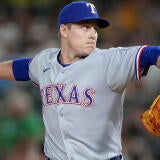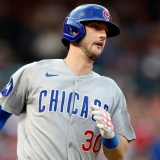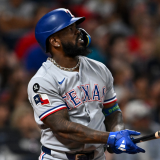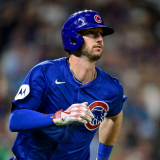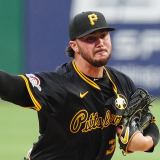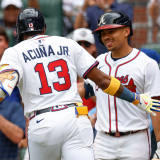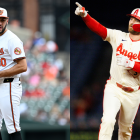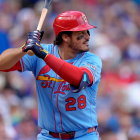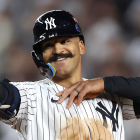What Samuel Basallo extension with Orioles means for franchise mainstay Adley Rutschman's future in Baltimore
The Orioles have locked up Basallo for the foreseeable future
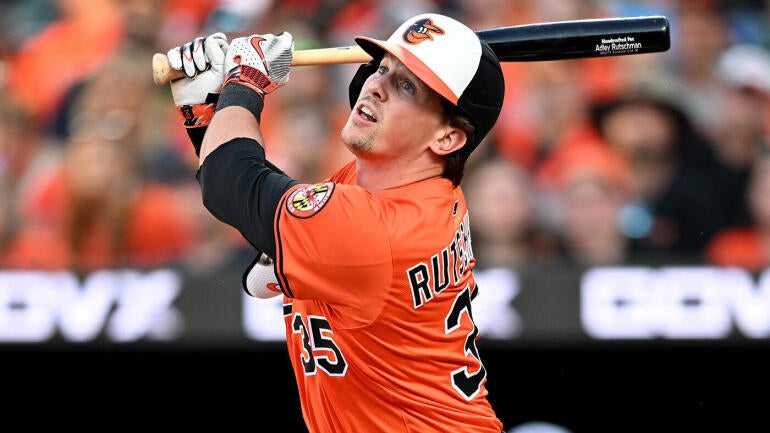
The Baltimore Orioles and catcher Samuel Basallo have reportedly agreed to an eight-year extension worth at least $67 million, the largest contract in Major League Baseball history for a backstop who has fewer than two years of service time. (Said record had previously belonged to Washington Nationals catcher Keibert Ruiz.) Basallo's deal is notable for other reasons, beginning with the fact that it was struck within a week of his big-league debut, and extending to the inevitability that it will spur conversation about what it means for lynchpin Adley Rutschman.
In the short run, neither Basallo's presence nor his contract will have any impact on Rutschman. That's because Rutschman was placed on the injured list on Thursday with a strained oblique. The Orioles haven't yet offered a timetable on when he might return this season. Realistically, there's a distinct possibility that his year is finished. The Orioles will close out their season on Sept. 28, which is a little more than five weeks away. For reference, players tend to miss more than five weeks on average on account of strained obliques, according to Baseball Prospectus' data.
The real question, then, is what the Orioles will do with Basallo and Rutschman after this season.
In a lot of ways, this is your classic pro sports situation. Basallo, one of the top youngsters in the sport, is a potential building block who could become a middle-of-the-order force for Baltimore over the next decade. Rutschman, though nearing his 28th birthday, is a two-time All-Star and one of the key members of the Orioles' resurgence under executive Mike Elias' watch. There are, essentially, three pathways for them to take: 1) have them split time behind the plate; 2) trade Rutschman; and/or 3) have them move one of the two from behind the plate to another position.
Let's break down what each scenario entails.
1. Splitting time
A catcher-by-committee approach is the path of least resistance. It shouldn't surprise anyone if it becomes a more popular strategy across the league over the coming years, either. The Atlanta Braves have shown that a strict timeshare between two competent catchers (first Sean Murphy and Travis d'Arnaud and now Murphy and Drake Baldwin) has benefits, such as preventing either from becoming overexerted physically. Even so, there are some potential drawbacks.
Foremost, a team operating with two quality backstops is potentially leaving value on the table. Not just in the sense that they could trade one of those players for help elsewhere, but also in the sense that they may not be maximizing either player's output. Take Basallo. His main appeal is his cleanup hitter upside. The Orioles aren't going to want to park him 81 times a year.
Now Samuel Basallo has recorded his 1st Camden Yards hit -- a 1-out single in the 6th inning.#Orioles' No. 1 prospect (@MLBPipeline's No. 8 overall) improves to 4-for-13 (.308) in his 4-game MLB career. pic.twitter.com/ybEHeyEBZB
— Jake Rill (@JakeDRill) August 22, 2025
In theory, the Orioles could use whichever catcher is not in the squat that particular day as their designated hitter or first baseman. Doing so forces other considerations into play. Would the Orioles feel obligated always to carry a third catcher in case of an injury? And how would they square that with the presence of first basemen Coby Mayo and Ryan Mountcastle?
There's also the matter of Basallo's development behind the plate, where he's not considered a good defensive presence. This seems less relevant here since the Orioles have already shown a willingness to cross-train him at catcher and first, even if that impacts his progress with the mitt.
So, keeping Basallo and Rutschman and having them share the catching workload may be the easiest solution to this champagne problem. That doesn't mean the Orioles will necessarily view it as the optimal or best path forward for reasons that are obvious and not.
2. Trading Rutschman
Other front offices speculating about which backstop the Orioles will trade have been commonplace in the industry for a while now. Heck, it's not even a new conversation for this website. CBS Sports' Dayn Perry highlighted the pros and cons of trading Rutschman back in July. The biggest effect of Basallo's extension is that the focus will be solely on Rutschman.
It's probably reasonable to identify this as the likeliest route for the Orioles to take -- if only because it's the most conventional one available to them.
The argument for trading Rutschman this winter is that he'll be two seasons away from free agency and that he should net a good return (perhaps at a position of need) since quality backstops are seldom made available at this stage of their careers. The counterargument is that Rutschman's trade value may be at its nadir. He'll be fresh off the least-productive season of his career, and it's possible that he'll have missed more than two months on account of injury.
Don't overlook that these Orioles will attempt to correct course and compete again next year. They may not want to task Basallo with handling a catching staff on a most-days basis right now anyway, and particularly not at a time when they're attempting to win a playoff spot.
That leaves one other option on the table.
3. Moving one elsewhere
Not to be confused with the timeshare scenario in the first subheading, this would entail having Rutschman and or Basallo move to another position on a permanent basis. This is, almost certainly, the least attractive and least likely possibility for the Orioles to entertain.
Put simply: moving Rutschman worsens the team defense and damages his trade value; relocating Basallo lowers his ceiling and makes the extension a little more curious. Maybe in a couple of years' time, the Orioles will conclude that Basallo just isn't meant for catching. Making that decision before it's deemed necessary would seem counterproductive at best.
As such, the odds are the Orioles will rule this out quickly -- if they haven't already -- and focus instead on which of the first two options is most attractive. All Friday's news does is guarantee that Basallo will be a big part of whatever conclusion the Orioles reach over the coming months.




